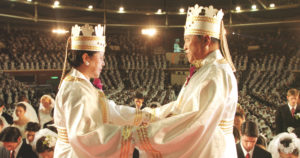When I first came to Japan, about 23 years ago, I watched an episode of a highly popular TV drama, set in a kindergarten, which featured a once-happy toddler who had suddenly become withdrawn. The staff couldn’t understand what was wrong, but it soon emerged the problem was his mother, who had selfishly abandoned her household duties to pursue a career. The horror! She was called to the school and, upon reflection, decided that she ought to give up her job and concentrate on her housewifely duties.
On the surface, Japan appears to have progressed a lot since then. The latest Japanese TV drama Modern Love (a sort of Japanese version of Love Actually) features a lesbian couple who are raising a child. Male homosexuality has featured on TV before and lesbianism is hinted at strongly in the ever-popular Takarazuka theatre (an all-female musical theatre troupe). But Modern Love is the first frank depiction of lesbianism on mainstream TV.
Japan is also starting to see the sort of identity-based skirmishes that are common in the West. Novelist Mieko Kawakami made headlines when she dared to interrogate prize-winning author Haruki Murakami over the depiction of female characters in his novels. During the pandemic, she also criticised the government’s Coronavirus task force for being all male.
The tide also seems to be turning in Japan’s leading universities. Once renowned for their conservatism, many seem to be adopting a Western-style “progressive” or “woke” agenda. Waseda University has introduced speech codes for staff when interacting with LGBTQI+ students, while the International Christian University spent a fortune last year building an unprecedented suite of gender-neutral toilets, and has added “other” to the list of gender options on class registers. Japan’s Women’s University is one of several all-female institutions considering the admission of transgender students.
Meanwhile, Japan’s universities are introducing more progressive content to their humanities courses. A spate of umbrella courses with blandly innocuous names, such as Sophia University’s “Sustainable Futures”, are geared to promoting the UN’s Sustainable Development Goals: modules focus on “gender”, “race”, “climate”, and “inclusivity”. As for recruitment, applicants for university positions are often informed that if a male and female candidate are regarded as being equally qualified, the female will be chosen.
But, as ever with Japan, appearances can be deceiving. Japan’s progressive wave is merely an illusion to appeal to the outside world. Despite superficial reforms, its university campuses are as placid as ever. Student activism is virtually unknown; teachers are still held in high esteem, and visiting speakers are treated well. I’ve seen a beauty contest advertised on campus, but never a demonstration. In a society where people recoil at the idea of revealing their innermost traumas in public, and where fierce employee loyalty is deeply ingrained, the MeToo movement never stood a chance. It didn’t grow much beyond the campaign of a single victim, the TV journalist Shiori Itō, and as with Black Lives Matter hardly featured on Japanese campuses at all.
A likelier explanation for these reforms is a desire to attract foreign staff and students to boost university incomes. The Japanese government has been trying to increase the numbers of overseas students in Japan since it initiated its Global University Project in 2014, which selected 37 universities to subsidise for 10 years. In 2015, the government set an ambitious target of 10 Japanese universities in the Times Education top 100 rankings, which it is yet to achieve. There is much talk of Japan needing “globalised citizens” to revitalise the economy. To achieve these goals, a more “progressive” posture had to be struck to counter perceptions of Japanese universities as staid and backward looking.
Ultimately, the difference between wokeness in the West and in Japan is this: in the West, much of the impetus in universities seems to be coming from the students — at least a loud and determined minority; while in Japan the process is top-down and aimed at generating revenue. It’s not real: no one is cancelled and there are no “safe spaces”. Japanese students, if they even notice reforms, are often simply baffled by it all.
Similarly with TV dramas, there is little evidence of any desire on the part of the audience for more “modern” storylines. The most popular shows are still strikingly old-fashioned: presenters are rough-looking middle-aged men in shiny suits, with perky, deferential female sidekicks. They are known as se desu ne (“yes that’s right”) girls and their role is to be attractive and laugh at men’s jokes. The same goes for the music industry. The 48 female members of pop group AKB48 are selected for cuteness, sweetness, and air of innocence. Like all TV talents, they are inevitably controlled by agencies run by men.
As for Modern Love, could envy at the success of South Korea’s Squid Game and Parasite be having an influence on Japanese TV producers? Japan is an old hand at selling its culture overseas. The country is ranked fifth in the Global Soft Power Index, and its cultural influence in the UK is growing: Hideki Noda’s (‘Q’) — a drama blending kabuki with songs by Queen — played in London recently, and the Royal Shakespeare Company’s performance of Studio Ghibli’s My Neighbour Totoro has racked up nine nominations in the WhatsOnStage awards. Perhaps progressive posturing is part of an attempt to trigger a “cool Japan” wave in the West to rival the Korean wave known as hallyu?
To paraphrase Paul Valéry, in the modern world, everything changes but the avant-garde… and Japanese society. The corporate world remains unshakeably male, and calls to recognise same-sex marriage as constitutionally valid were thwarted in the courts in Osaka and Tokyo at the end of November. Japan languishes at 116 (out of 146) in the global gender equality rankings produced by the World Economic Forum in 2022.
It’s not clear how many Japanese people care. Long-term residents will recognise that, however dominant men seem to be, women wield considerable power in the domestic realm and beyond. A good example of this can be found in the inner workings of the formidable modern Buddhist group Soka Gakkai, whose political wing Komeito remains a coalition partner in government. Soka Gakkai is controlled, it is believed, by an all-female praesidium known as the married women’s association (the “Fujimbu”) which dictates the organisation’s policy.
Yet if progressive posturing is good for the Japanese economy, then so be it. Since the Meiji era (1868-1912), the Japanese have been renowned for refashioning foreign ideas into a distinct and efficient form. Japan’s police are based on the French gendarmerie, its schools on Germany’s gymnasiums, and its broadcasting service NHK on the BBC. The same goes for the arts: bonsai originated in China, as did the tea ceremony.
The phrase “go woke, go broke” might be a valuable warning in the West, but in Japan that message has been lost in translation. A full rejection of progressive Western values would be counterproductive: far better to appear to go along with it superficially, while changing nothing of consequence. Far better, and far more Japanese.
***
Order your copy of UnHerd’s first print edition here.
Disclaimer
Some of the posts we share are controversial and we do not necessarily agree with them in the whole extend. Sometimes we agree with the content or part of it but we do not agree with the narration or language. Nevertheless we find them somehow interesting, valuable and/or informative or we share them, because we strongly believe in freedom of speech, free press and journalism. We strongly encourage you to have a critical approach to all the content, do your own research and analysis to build your own opinion.
We would be glad to have your feedback.
Source: UnHerd Read the original article here: https://unherd.com/



